Find Out Everything About the Allianz Arena Stadium!
16-04-2024
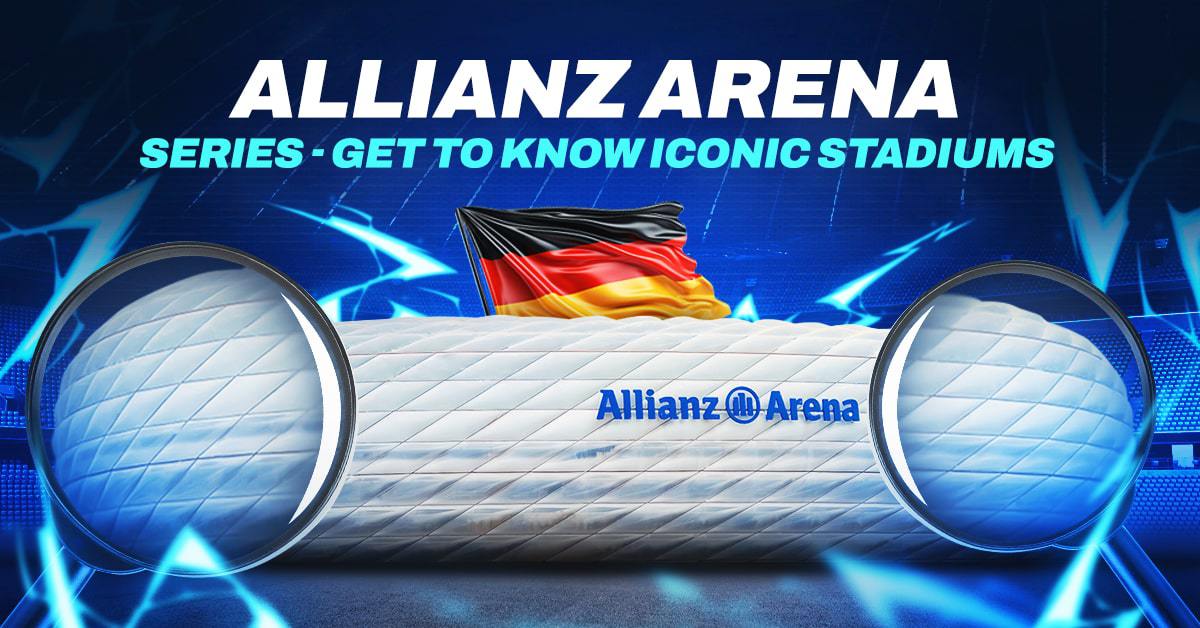
Find Out Everything About the Allianz Arena Stadium!
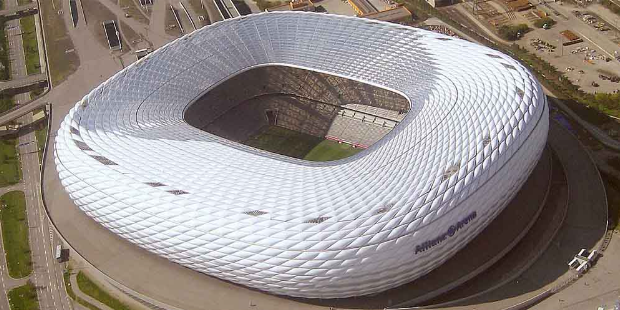
In the world of football, several legendary stadiums have left an indelible mark on the sport. From the iconic Santiago Bernabéu Stadium to the historic Giuseppe Meazza Stadium and the legendary Maracanã Stadium, each holds a unique place in the hearts of fans worldwide. More recently, the Allianz Arena München Stadium, situated in the southern city of Germany, has also made its mark as a modern marvel of football architecture.
The Allianz Arena has been the host of many important football matches and events in the last two decades, from relevant international games to Bundesliga games, the local tournament of the Teutonic country.
The Football Arena München Stadium has also been selected as one of the ten stadiums that will host the matches of the EURO 2024 in Germany. What’s more, the opening match of this important tournament between Germany and Scotland will take place in this marvelous piece of architecture!
Let’s discover all the aspects of this magnificent stadium that will arrange some of the most breathtaking international matches of the UEFA EURO 2024, the Champion League, and many others in the future.
Table of Contents:
Find Out Everything About the Allianz Arena Stadium!
What Is the Allianz Arena Stadium?
What Football Clubs Have Played in the Allianz Arena?
Matches of the 2006 FIFA World Cup that Took Place in the Allianz Arena
Other Relevant Matches in the Allianz Arena
FootballTeam Game and the Allianz Arena Stadium
What Is the Allianz Arena Stadium?

Allianz Arena, also known as Football Arena München, is a football stadium located in Munich, Bavaria, Germany. It has a seating capacity of 70,000 people, including regular and wheelchair users. It was the first stadium in the world to incorporate a fully changing exterior, which we were able to see later in other stadiums worldwide, such as the famous Water Cube, known as the National Aquatics Center, located in Beijing, China. It’s the second-biggest stadium in Germany behind Westfalenstadion, located in Dortmund.
The Allianz Arena Location
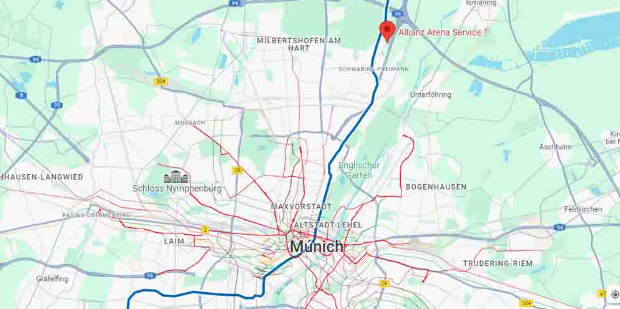
The Allianz Arena stadium is located on the northern edge of Munich, 10 kilometers from the city centre, specifically in the Schwabing-Freimann district in Fröttmaning Heath. The Stadium is very accessible and has several routes to get there, either by car or by metro.
The stadium is located next to the A9 and A99 motorways. If you are arriving at the stadium from the A9, take exit 73 München-Fröttmaning-Süd to reach the structure. If you are coming from the A99 west, you should take exit 12b München-Fröttmaning-Nord.
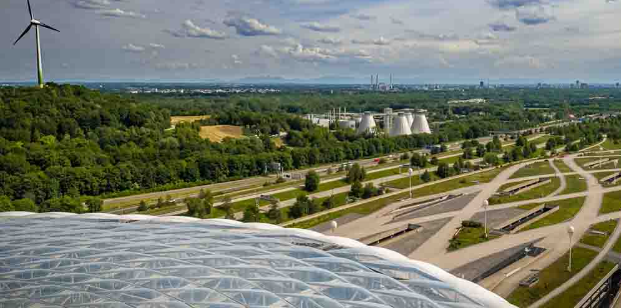
You can also get to the Allianz Arena using public transport, the metro. If this is your choice, you should take line 6 right at the center of Munich's old town, at the Marienplatz stop. The trip will take about 15 minutes. From Munich's two major train stations (Hauptbahnhof and Ostbahnhof), there are tram connections to Marienplatz. The address is: München Stadion GmbH, Werner-Heisenberg-Allee 25, 80939 Munich.
What Football Clubs Have Played in the Allianz Arena?
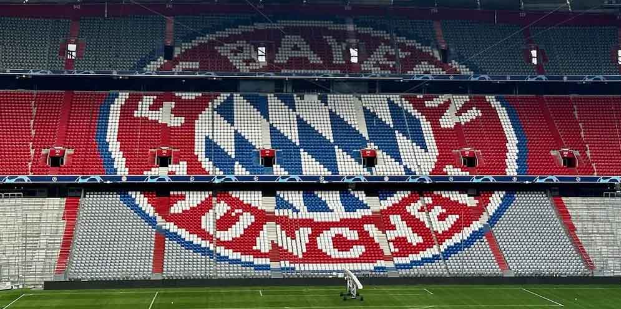
The FC Bayern München is the current owner of the Allianz Arena. This team has played its home games since the 2005 - 2006 season. TSV 1860 Munich previously shared 50 percent of the stadium, but the team sold its half to FC Bayern in 2006. Currently, the 1860 can play its home games in the Allianz Arena Stadium until 2025, even though it’s not retaining the ownership.
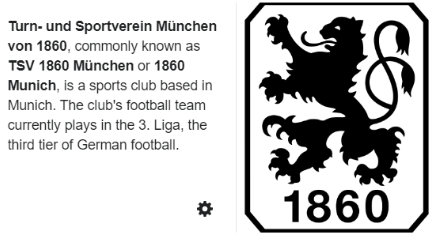
Source: Wikipedia.
Allianz Arena Facilities
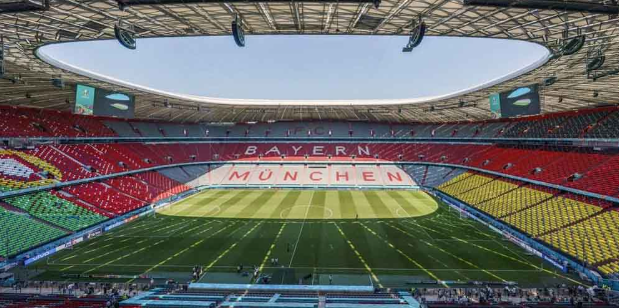
As we previously saw in the other sections, the Allianz Arena is one of the largest football structures in all of Europe. As such, inside the Arena, there are approximately 6,500 m² of catering facilities. These are divided into the following sections:
🔸Seater capacity: 68,000 seats lower tier, 20,000 seats middle tier, and 24,000 seats upper tier. It also has 227 special seats for disabled people at the main entrance and exterior ground level.
🔸In the North and South Stands: 13,740 standing places, 2,200 business seats, and media seats.
🔸106 VIP boxes of various sizes accommodating.
🔸28 kiosks.
🔸Press club with approx 350 seats Mixed Zone (520 m²).
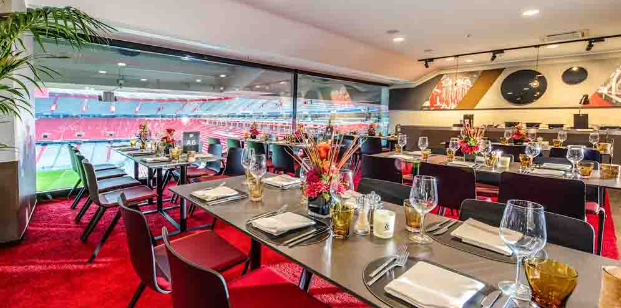
🔸Two fan restaurants (one in the north and another in the south stand), each with 1,500 seats.
🔸Offices and conference facilities.
🔸Arena Bistro with approx 400 seats.
🔸Large and comfortable media areas.
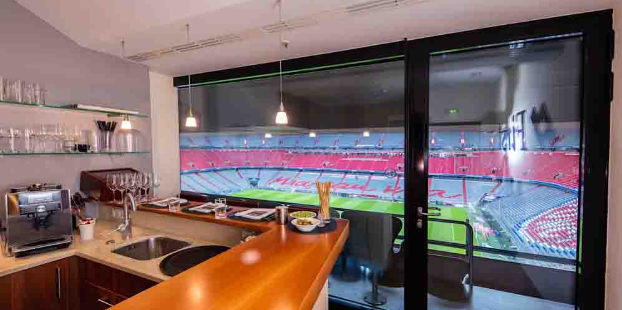
🔸LEGO Spielwelt (nursery) 54 ticket counters.
🔸FC Bayern Erlebniswelt (Germany's biggest club museum). The 60-minute tour includes a promenade across the stands, players' tunnel, changing rooms, sponsor lounge, and press club.
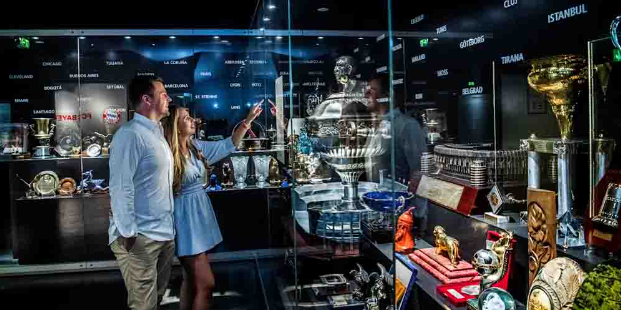
🔸Changing rooms: one for FC Bayern, another for TSV 1860, two for visitors, four for coaches, two warm-up rooms, each 110m², and two locker rooms for referees.
🔸The Allianz Arena has the largest parking structure in Europe, with 9,800 parking spaces spread over four x four floors. The Parking Esplanade has 1,200 parking spaces distributed on two levels, in addition to 350 coach spaces (240 to the north and 110 to the south of the Esplanade) and 130 parking spaces for visitors in wheelchairs and the like.
Allianz Arena History
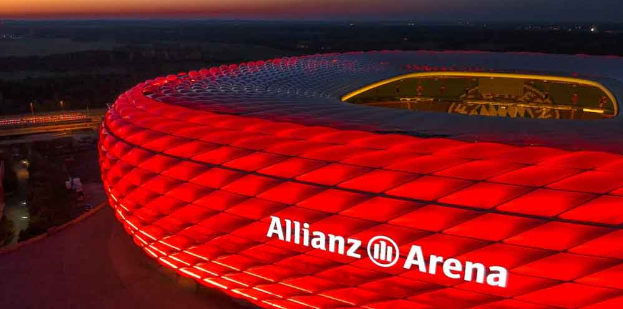
In March 1997, the two Munich teams, FC Bayern and TSV 1860, agreed to build a new stadium for both teams. The citizens wanted to remodel the Olympic Stadium, but after a referendum, the supervisory board of FC Bayern Munich approved the construction of the new stadium.
In April 2001, Bayern and 1860 allied to build a new stadium for their teams. The consensus was that the stadium would have a revolutionary architecture that would allow spectators to witness matches like nowhere else.
In July 2001, both teams decided to implement the project in Fröttmaning, an area north of the city of Munich. This decision was ratified in the referendum of October 21, 2021, where an almost unanimous city council decided to build the new stadium and bear the infrastructure costs.
In December of the same year, Bayern and TSV 1860 each acquired a 50% stake in the project's construction and operation company, München Stadion GmbH.
In February 2002, the Swiss architecture firm Herzog & de Meuron was chosen as the studio in charge of designing the building after presenting a model that met the public's demands.
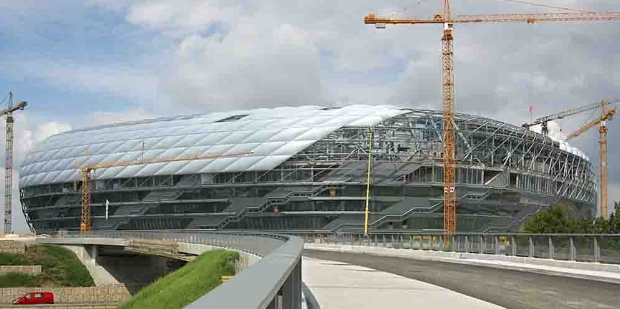
The first foundation stone was laid in its place on October 21, 2002, by the legendary footballer Franz Beckenbauer. The stone was lowered from the sky, accompanied by a laser show that began the work.
In March 2004, the basic structural work was completed. It means that the reinforced concrete structure and steel beams were in place. The first lighting test took place on October 21, 2004. It was carried out with 120 foil cushions. The exterior façade was completed on November 5, 2004.
On April 18, 2005, the Allianz Arena logo was proudly installed on its façade, adding to the stadium's iconic presence. Featuring twelve illuminated letters, the logo stands as a symbol of the arena's significance in the world of football. Two identical copies of the logo were carefully mounted on opposite sides of the facade, each weighing between 250 and 500 kg, ensuring a striking display visible from all angles.
The construction of the Allianz Arena was completed on April 30, 2005. On that day, the company Alpine Bau GmbH officially handed over the stadium to the new owners, München Stadion GmbH. The external infrastructure was completed on May 4, 2005.
The official opening took place on May 30 and 31, 2005. The first team to step onto the field was TSV 1860, with a traditional match against Nuremberg. The next day, FC Bayern played against the German national team.
In 2017, the largest video walls in Europe were installed inside the stadium. The contract between TSV München von 1860 GmbH & Co. and Allianz Arena München Stadion GmbH was also canceled this year.
Allianz Arena Architecture
Allianz Arena was designed by the Swiss architecture study Herzog & de Meuron in 2002. The works started the same year thanks to the financial contributions of the insurance company Allianz, which contributed to the project in exchange for the stadium bearing its name for the next 30 years.
The Allianz Arena is 258 meters long, 227 meters wide, and 50 meters high. The pitch game is 150 meters long x 60 meters wide.
Spectator distance from pitch: 7.5 m minimum Pitchside barrier height: approx 1.2 m Seat row gradients: Lower tier: approx 24° Middle tier: approx 30° Upper tier: approx 34° 2 x 100 m² LED Video Walls in 16:9 format, 42.5 m above ground 224 halogen floodlights at 45m above pitch level.
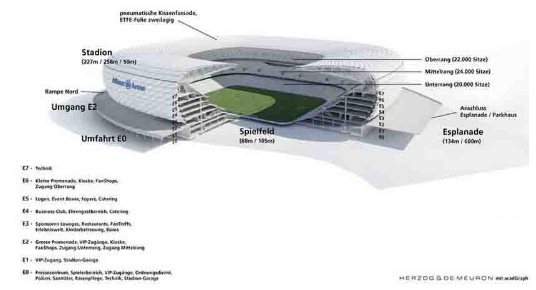
The construction is built with 120,000 m3 of reinforced concrete and 22.000 tons of steel. This way, the Stadium can support the weight of the roof thanks to the tensile effect of the steel beams.
Still, one of the most representative elements of the Allianz Arena architecture is the outer enclosure of the stadium, a 66,500 m2 laminate facade containing LED lighting technology. It integrates 2,874 rhomboidal panels of ETFE (Ethylene Tetrafluoroethylene), a particular plastic with a high corrosion resistance over a wide temperature.
Each panel can be illuminated with three colours (white, red, and blue) depending on the occasion. For example, when the German team plays, the panels are completely white. On the other hand, when FC Bayern Munich plays, the stadium turns red.
Matches of the 2006 FIFA World Cup that Took Place in the Allianz Arena
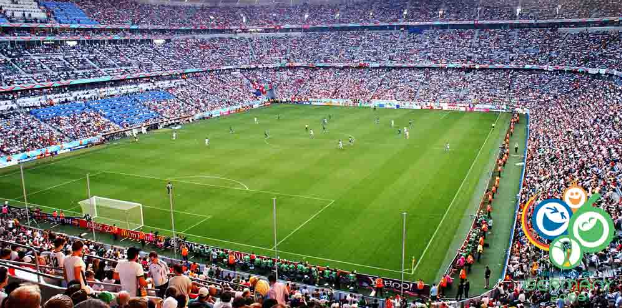
During the 2006 FIFA World Cup that occurred in Germany, the Allianz Arena hosted 6 matches in total, four in the first round, or group stage, and two more in the second round, one in the round of 16 and the other in the semi-finals. The matches were the following:
Date | Team #1 | Result | Team #2 | Round | Spectators |
June 9, 2006 | Germany | 4-2 | Costa Rica | First Round, Group A | 69,451 |
June 14, 2006 | Tunisia | 2-2 | Saudi Arabia | First Round, Group H | 69,451 |
June 18, 2006 | Brazil | 2-0 | Australia | First Round, Group F | 69,451 |
June 21, 2006 | Ivory Coast | 3-2 | Serbia and Montenegro | First Round, Group C | 69,451 |
June 24, 2006 | Germany | 2-0 | Sweden | Round of 16 | 69,451 |
July 5, 2006 | Portugal | 0-1 | France | Semifinals | 69,451 |
Matches of the UEFA 2020
The Allianz Arena also hosted four matches of the UEFA 2020, three matches of the first round, and one match of the quarter-finals.
Date | Team #1 | Result | Team #2 | Round | Spectators |
June 15, 2021 | France | 1-0 | Germany | First Round, Group F | 13,000 |
June 19, 2021 | Portugal | 2-4 | Germany | First Round, Group F | 12,926 |
June 23, 2021 | Germany | 2-2 | Hungry | First Round, Group F | 12,413 |
July 2, 2021 | Belgium | 1-2 | Italy | Quarter Finals | 12,984 |
Matches of the UEFA EURO 2024
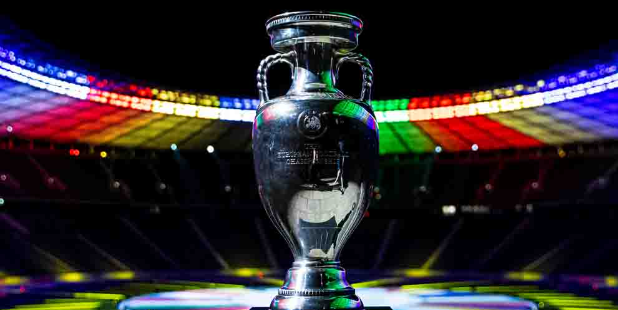
As mentioned earlier, the Allianz Arena stands among the top ten stadiums hosting prestigious matches, alongside other structures like the Zentralstadion Leipzig (Red Bull Arena), home to RB Leipzig, the Olympiastadion in Berlin, where Hertha Berliner Sport Club competes, and the MPHArena, hosting home games of the VfB Stuttgart. These renowned stadiums collectively host a series of world-class matches, showcasing top-tier football talent.
Date | Time | Team #1 | Team #2 | Round |
June 14, 2024 | 21:00 | Germany | Scotland | First Round, Group A |
June 17, 2024 | 15:00 | Romania | Winner Path B | First Round, Group C |
June 20, 2024 | 15:00 | Slovenia | Serbia | First Round, Group C |
June 25, 2024 | 21:00 | Denmark | Serbia | First Round, Group C |
July 2, 2024 | 18:00 | Winner Group E | 3A/B/C/D | Round of 16 |
July 9, 2024 | 21:00 | - | - | Semifinals |
Other Relevant Matches in the Allianz Arena
In 2012, the Allianz Arena hosted the UEFA Champions League final, a highly anticipated match between Chelsea and Bayern Munich on May 19. Despite a 1-1 tie in regulation time, the home team, Bayern Munich, faced defeat in a heartbreaking penalty shootout. Ivica Olić and Bastian Schweinsteiger's missed penalties added to the disappointment of the Bavarian side in what was famously dubbed "Finale dahoam" (the Bavarian final played at home).
On Wednesday, April 17, 2024, at 9:00 p.m., the Allianz Stadium will host the match between FC Bayern Munich and Arsenal FC, which corresponds to one of the matches in the quarterfinals of the Champions League. Tickets are now available on the Allianz Arena official site.
FootballTeam Game and the Allianz Arena Stadium
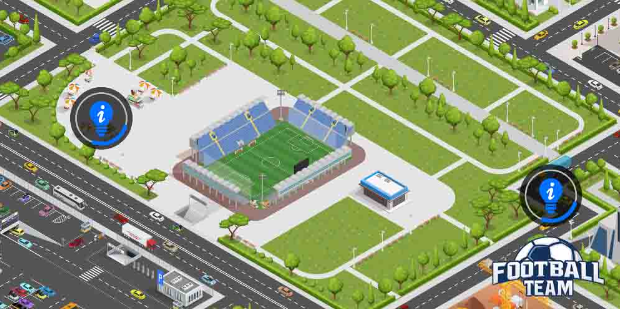
Playing FootballTeam Game allows you to build the stadium of your dreams, even one very similar to the Allianz Arena in terms of magnificence and number of spectators! If you want to play in a breathtaking stadium, like the monumental structure of FC Bayern, FootballTeam is waiting for you! Join FootballTeam now, build your team and stadium, and become the next biggest club in the world!
Immerse yourself in the fast-paced atmosphere of football stadiums with the ultimate web browser and football manager experience, FootballTeam Game. Look no further and start your career in the world of Football. FootballTeam is your ticket to the action. Join us now and experience the thrill of victory daily!



Leave comment
Users must be logged in to comment.
7 Comments